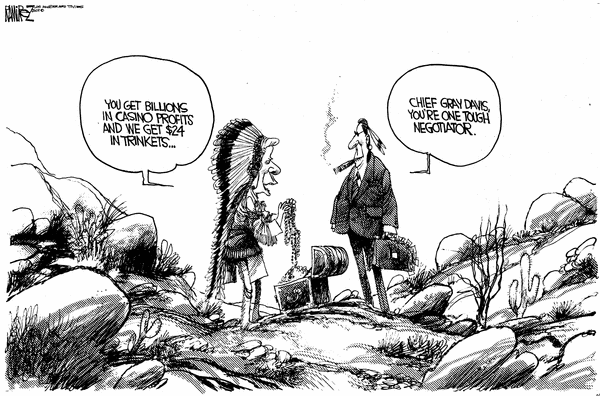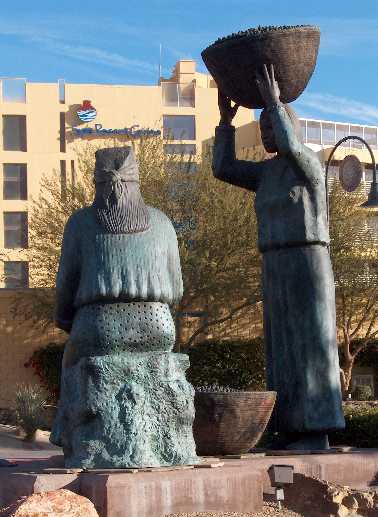 Another Stereotype of the Month entry:
Another Stereotype of the Month entry:
 Another Stereotype of the Month entry:
Another Stereotype of the Month entry:
From canoe.ca:
COLUMNIST
Tue, December 14, 2004
Trying to tame the gambling monster
By Mindelle Jacobs — For the Edmonton Sun
Native casinos as places of healing, pride and cultural restoration? Sounds crazy, right? Even gambling's most avid apologists aren't that laudatory.
Meet self-described indigenous cultural specialist Tom McCormack. He hates commercial gambling with a passion.
It increases alcoholism, drug use, violence, prostitution and suicide, he charges.
The solution, says the U.S. indigenous storyteller and performing artist, is to revolutionize native casinos so they help -- not hurt -- aboriginals.
McCormack, 54, hopes to convince Canadian native bands to set up aboriginal gaming facilities based on traditional, ancestral games.
The games would all require some skill, unlike in ordinary casinos, the odds of winning would be better and entrance would be restricted to aboriginals.
And only a small portion of the winnings -- from the limited skill games -- would be in the form of cash.
Most of the winnings would consist of coupons for holistic health services for things like therapeutic massage, aromatherapy and acupuncture.
Gamblers could also play for native art, indigenous natural foods or, in the case of the more skilled games, a car or a house.
McCormack envisages auto manufacturers and housing contractors donating their products to native casinos in exchange for advertising.
"We're taking this (gambling) monster and turning it around," says McCormack, who is in Edmonton performing aboriginal storytelling at local schools.
"There will be things going on that will uplift the spirit, not all the noise and racket and bright lights and glittering people coming up and hustling drinks and ... trying to suck money out of you," he says.
Let non-natives continue to lose money in regular commercial casinos that destroy so many lives, he says. In contrast, native casinos based on the indigenous gaming concept can be a force for good, he says.
McCormack hasn't lobbied any American native bands about his idea yet. He'd like to see a pilot project here first because he thinks Canadian aboriginals are more open-minded.
Counsellors and educators reacted positively to his suggestion at a native gambling awareness conference in Winnipeg last month, he says.
But informal endorsement at a seminar is a long way from the real thing.
McCormack approached the Enoch Cree Nation with the concept but Enoch band Chief Ron Morin isn't exactly fired up over the idea.
The band, which just broke ground on a large casino complex, has no plans to incorporate traditional First Nations games of chance into the mix, he said yesterday.
But that doesn't mean the band wouldn't consider the model in the future, he added.
Nevertheless, Morin said he's opposed to restricting a casino to aboriginals.
And he's skeptical of the notion of introducing games with better odds.
"If there's not much profit margin for the house, how do you pay the workers?" he asked. "How do you get investors?"
McCormack remains undaunted. Native casinos that use ancestral games can still make good money but concern for the community has to take precedence over greed, he says.
Drugs, alcohol, violence, suicide and prostitution are the "bad medicine curse" of the commercial casino industry, he says.
"It's an abyss," he adds. "Greed is a terrible thing."
Maybe so. But I think McCormack has a tough hill to climb.
Gambling for aromatherapy?
That's hardly a gate-crasher.

Rob's reply
The subtext of this article is that modern civilization is corrupt and greedy while traditional indigenous cultures were touchy-feely, New Age communes. This is stereotypical, of course. Let's see how this essay denigrates life today as "bad medicine":
>> Native casinos as places of healing, pride and cultural restoration? Sounds crazy, right? Even gambling's most avid apologists aren't that laudatory. <<
They aren't? Actually, statements like this are pretty common. The income, the sense of accomplishment, even the buildings themselves are instilling pride. The money is funding programs to restore tribal languages and cultures. All of that is having a profoundly healing effect.
>> It increases alcoholism, drug use, violence, prostitution and suicide, he charges. <<
If so, it increases them mainly among the non-Indian patrons, not the Indian owners. True, these problems are endemic to some reservations—but mainly the ones mired in poverty, not the ones escaping poverty through gaming.
>> The solution, says the U.S. indigenous storyteller and performing artist, is to revolutionize native casinos so they help -- not hurt -- aboriginals. <<
The solution to what problem? Substance abuse, violence, and so forth among non-Indian casino patrons? I'd say the solution is to fund more gambling awareness and addiction programs—not to impoverish Indians who are using their earnings to address these problems.
As for other solutions...how exactly are casinos hurting Indians? More important, what about all the positive effects, which McCormack and Jacobs somehow fail to mention? When you balance the positive and negative effects, you'll see the positive wins. It isn't even close; the balance is overwhelmingly positive.
That explains why many Indians are pursuing gaming rather than not pursuing it. If it was leading them to ruin, don't you think they'd be smart enough to stop doing it?
The implication of this is troubling: that modern life is corrupting Indians so badly they can't think straight. McCormack must think hat any Indians who aren't living in teepees and staying clean through sweat lodges and herbal remedies have lost their way.
>> The games would all require some skill, unlike in ordinary casinos, the odds of winning would be better and entrance would be restricted to aboriginals. <<
Restricting the customers to Indians would limit the income to a fraction of the current total. Having and spending that income is exactly what's causing the present wave of pride and healing. People who raise themselves up through hard work and business savvy generally feel good about it.
A "casino" business that doesn't make money is almost certain to fail. At the very least, it would do worse. How could a less successful business instill more pride than a more successful one?
>> Most of the winnings would consist of coupons for holistic health services for things like therapeutic massage, aromatherapy and acupuncture. <<
One, this implies Indians can't handle money as well as other people. Two, it implies Indians are particularly interested in holistic health services because they're so natural and spiritual. Science-bound Westerners want modern medicine while intuitive aboriginals prefer crystals and chants.
>> Gamblers could also play for native art, indigenous natural foods or, in the case of the more skilled games, a car or a house. <<
Another insinuation that Indians don't live in a cash economy—that all they need is food and art to survive.
>> "There will be things going on that will uplift the spirit, not all the noise and racket and bright lights and glittering people coming up and hustling drinks and ... trying to suck money out of you," he says. <<
Again, McCormack is talking about the patrons, not the Indians. For the most part, tribal members don't hang around in their own casinos waiting to get sucked dry.
>> Let non-natives continue to lose money in regular commercial casinos that destroy so many lives, he says. In contrast, native casinos based on the indigenous gaming concept can be a force for good, he says. <<
Native casinos are already a force for good.
Let's see if I understand Jacobs's plan. Rather than open a casino, operate slot machines, earn lots of money, and spend it on health services, Indians should go to a casino, play indigenous games, earn a little bit of money in coupon form, and redeem it for health services.
>> McCormack hasn't lobbied any American native bands about his idea yet. He'd like to see a pilot project here first because he thinks Canadian aboriginals are more open-minded. <<
What's there to be openminded about? McCormack has grossly misstated the drawbacks of Indian gaming and ignored the benefits altogether. Let him open his mind and correct his ignorance about the subject.
>> McCormack remains undaunted. Native casinos that use ancestral games can still make good money but concern for the community has to take precedence over greed, he says. <<
Indian casinos get much of their income from slot machines. If a tribal casino removed these slots, it would lose as much as 75% of its annual income. How will an "aboriginal casino" with only Indians as customers make up for that?
All this essay appears to be saying is that money is the root of all evil—that being poor and hungry is better than being rich and well-fed. Which isn't what modern-day people believe and isn't what Indians traditionally believed, either.
Most people seek to increase their wealth; very few seek to decrease it. That Indians are somehow different, spiritually pure and unconcerned with material goods, is flatly ridiculous. Traditionally Indians of various tribes owned land, slaves, horses, pelts, and other goods. They couldn't have conducted trade if they didn't consider objects property with measurable value.
Related links
Greedy Indians
New Age mystics, healers, and ceremonies
The facts about Indian gaming
|
. . . |

|
All material © copyright its original owners, except where noted.
Original text and pictures © copyright 2007 by Robert Schmidt.
Copyrighted material is posted under the Fair Use provision of the Copyright Act,
which allows copying for nonprofit educational uses including criticism and commentary.
Comments sent to the publisher become the property of Blue Corn Comics
and may be used in other postings without permission.